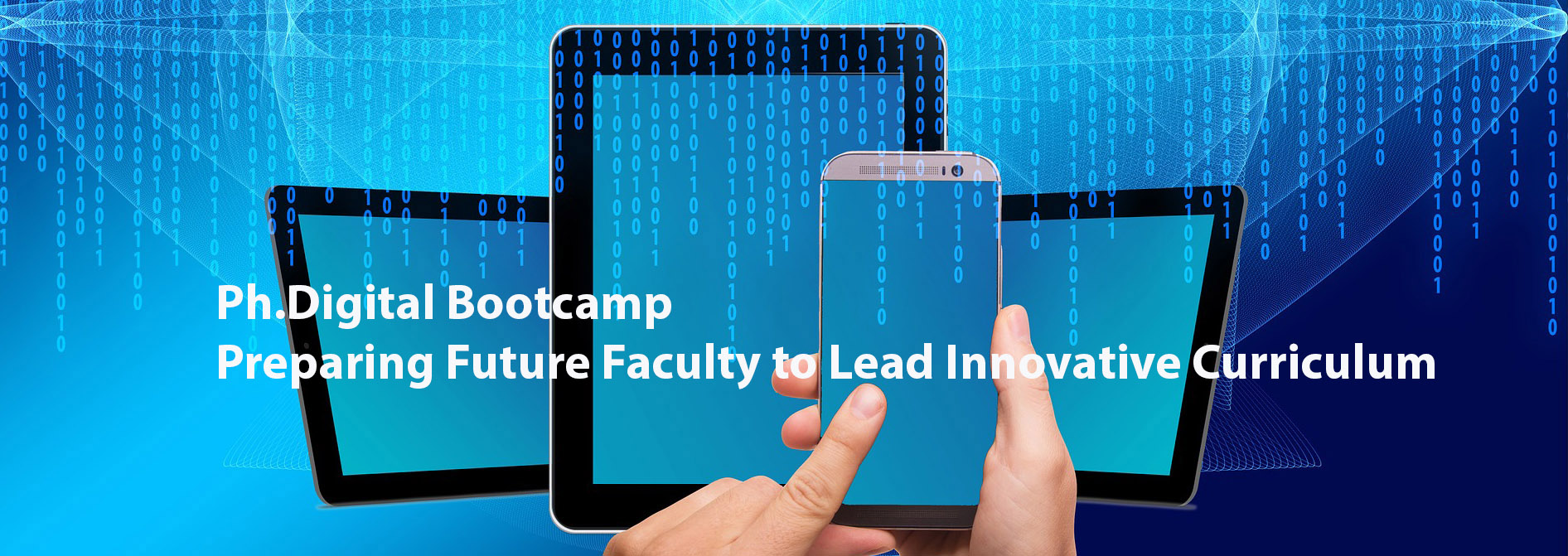
Instructor: Cindy Royal
July 11-15; Zoom July 15, 1-5pm CT
Introduction
In this module, we will read and discuss research on pedagogy and curriculum associated with emerging digital topics. You don’t have to read all the items below. Seek out and review the topics that most interest you. We will have a discussion about putting PhDigital concepts into action in your own curriculum.
Curriculum and Pedagogy
We’ve covered a lot of ground over the last several weeks! The challenge in this dynamic, digital world is keeping up with changing topics AND being able to teach them. This is no easy task. In addition to the specific skills a student learns in a program, I feel that a certain mindset must emerge to cope with and be successful in this environment. I will be interested in your thoughts.
Amanda Bright, 2018 PhDigital Bootcamp fellow will be joining us during our final session to discuss her progress since the Bootcamp completed.
Articles I’ve Written on Curriculum Issues – these articles track some of the thinking over time that went into our curriculum changes that you read about in our module on Product Management.
Journalism Schools Need to Get Better at Teaching Tech Where the Girls Are – I have long written about the opportunity (and responsibility) to teach tech skills to women in our disciplines with high percentages of women
At the Intersection of Journalism, Data Science and Digital Media: How Can J-Schools Prep Students for the World They’re Headed Into – Amy Schmitz Weiss and I separately tackle issue regarding digital curriculum.
We Need a Digital First Curriculum to Teach Modern Journalism – some early writing on curriculum issues
Why Universities Need to Embrace Coding Across the Curriculum – I make the case that coding should be taught broadly across the university, not just in computer science, because all disciplines have problems that can be addressed via programming.
Articles on Emerging Tech, Skills and Curriculum
Journalism Employability in the Modern Newsroom: Insights From Applicant Resumes and Cover Letters, JMCE, 2021 (TJ Thomson is lead author)
Teaching Social Media Journalism: Challenges and Opportunities for Future Curriculum Design, JMCE, 2014
Defining and Teaching Data Journalism: A Typology, JMCE, 2020
Pushing Boundaries: How Coding Is (and Isn’t) Taught in Accredited Journalism Programs, JMCE, 2020
Examining Motivations and Strategies for Integrating Social Media Technologies Into the Classroom, JMCE, 2020 by 2019 PhDigital Fellow Brooke Auxier
WJEC’s Paris Syndicate Program: Discussions Advance Global Journalism Education, JMCE, 2020
Entrepreneurial Journalism: Teaching Innovation and Nurturing an Entrepreneurial Mindset, JMCE 2020
Journalism Training Beyond Journalism Schools, JMCE, 2020
Journalism schools often don’t teach audience engagement skills. Here’s how students can make up for it, Poynter, 2021
Four Takeaways for Virtual Reality in Journalism and Education , MediaShift, 2016
Why Journalism Students Need a Baseline Understanding of Coding , MediaShift, 2015
The Future of Education: How A.I. and Immersive Tech Will Reshape Learning Forever , Medium, 2017
Global Journalism Education in the 21st Century – Free e-book. I contributed a chapter in this on Coding the Curriculum
Coding Pedagogy edited by Jeremy Sarachan, 2019. I contributed a chapter on teaching my Mobile App Development course.
JCME Special Issue on Teaching Online Through the Pandemic, 2021
These items on Curriculum Innovation were linked on the Product module, but reiterated here related to pedagogy:
- A Qualitative Look at Journalism Programs in Flux: The Role of Faculty in the Movement Toward a Digital Curriculum, Amanda Bright, Teaching Journalism and Mass Communication, 2018; Amanda was a 2018 PhDigital Fellow.
- Redefining Doctoral Education: Preparing Future Faculty to Lead Emerging Media Curriculum, Teaching Journalism and Mass Communication, 2019
- Your Journalism Curriculum is Obsolete, Nieman Journalism Lab, Royal 2017
- For Journalism Curriculum to Change, It’s Faculty Needs Disruption, Nieman Journalism Lab, Royal 2018
- Prepare Media Students for Skills, Not Job Titles, Nieman Journalism Lab, Royal 2019
- Are Journalism Schools Teaching Their Students the Right Skills, Nieman Journalism Lab, Royal 2014
There are additional items on the Resources page of this site.
Recommended Conferences and Organizations – these conferences may not be the typical ones that academics attend, but they can provide valuable insight into the future of curriculum topics.
South By Southwest Interactive
International Symposium on Online Journalism
National Institute for Computer-Assisted Reporting
World Journalism Education Council
Discussion – Discuss these items in the #pedagogy channel.
- What are the challenges and opportunities you see in integrating these topics in curriculum at the places where you are studying and working (or wish to work)? Address at both the undergraduate and master’s level. What programs do you think are the most innovative in their approaches to digital curriculum?
- And how about doctoral education? Now that you have been through these modules, how do you think doctoral programs should change? What are the challenges? And what are the risks if they don’t? Think about both short-term and long-term effects. As PhDs, how can we be responsible to our students in providing them the best foundation for future success through our own preparation?
Take a look at our Slack. You have created quite a body of work with ideas and resources. Feel free to review those channels when the program is over. The modules will continue to be available on this site for your future reference.
Module Evaluation
After each module, you will be asked to do an evaluation. Go to the link for the PhDigital 2022 Zoom Modules Evaluation and select the module you are reviewing. Please do this as soon as you can after the Zoom session.
Final Curriculum Assignment
What is your dream course, program or degree? Create an outline for a proposed course, program or degree, including mission/description, objectives, topics outline and provide a few relevant resources. Just a page or two is fine. This can be for an undergraduate or graduate program (or even a new doctoral program!), a minor or concentration, whatever you think is necessary in your current environment, future employment home or the discipline at large. Post in the #finalcurriculum Slack channel. Turn this in by July 22.
Final Evaluation – Please take a moment to do the PhDigital Online Final Evaluation. This is an evaluation of the program as a whole. We really appreciate the time you took to evaluate each module and the program.
